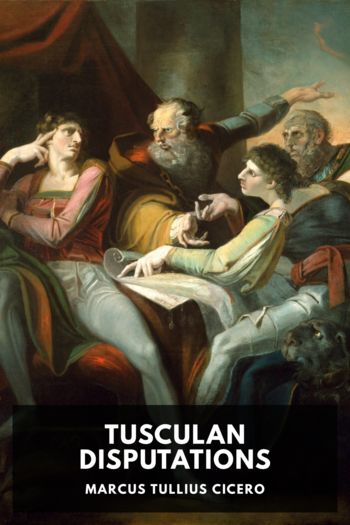Tusculan Disputations - Cicero (red novels TXT) 📗

- Author: Cicero
Book online «Tusculan Disputations - Cicero (red novels TXT) 📗». Author Cicero
But let us not dwell too much on these questions, but rather let us return to our subject. I say, and say again, that happiness will submit even to be tormented; and that in pursuit of justice, and temperance, and still more especially and principally fortitude, and greatness of soul, and patience, it will not stop short at sight of the executioner; and when all other virtues proceed calmly to the torture, that one will never halt, as I said, on the outside and threshold of the prison; for what can be baser, what can carry a worse appearance, than to be left alone, separated from those beautiful attendants? Not, however, that this is by any means possible, for neither can the virtues hold together without happiness, nor happiness without the virtues, so that they will not suffer her to desert them, but will carry her along with them, to whatever torments, to whatever pain they are led. For it is the peculiar quality of a wise man to do nothing that he may repent of, nothing against his inclination, but always to act nobly, with constancy, gravity, and honesty; to depend on nothing as certainty; to wonder at nothing, when it falls out, as if it appeared strange and unexpected to him; to be independent of everyone, and abide by his own opinion. For my part, I cannot form an idea of anything happier than this. The conclusion of the Stoics is indeed easy, for since they are persuaded that the end of good is to live agreeably to nature, and to be consistent with that—as a wise man should do so, not only because it is his duty, but because it is in his power—it must, of course, follow that whoever has the chief good in his power has his happiness so too. And thus the life of a wise man is always happy. You have here what I think may be confidently said of a happy life, and as things now stand, very truly also, unless you can advance something better.
A. Indeed I cannot. But I should be glad to prevail on you, unless it is troublesome (as you are under no confinement from obligations to any particular sect, but gather from all of them whatever strikes you most as having the appearance of probability), as you just now seemed to advise the Peripatetics and the Old Academy boldly to speak out without reserve, “that wise men are always the happiest,” I should be glad to hear how you think it consistent for them to say so, when you have said so much against that opinion, and the conclusions of the Stoics. M.I will make use, then, of that liberty which no one has the privilege of using in philosophy but those of our school, whose discourses determine nothing, but take in everything, leaving them unsupported by the authority of any particular person, to be judged of by others according to their weight. And as you seem desirous of knowing how it is that, notwithstanding the different opinions of philosophers with regard to the ends of goods, virtue has still sufficient security for the effecting of a happy life—which security, as we are informed, Carneades used indeed to dispute against. But he disputed as against the Stoics, whose opinions he combated with great zeal and vehemence. I, however, shall handle the question with more temper, for if the Stoics have rightly settled the ends of goods, the affair is at an end, for a wise man must necessarily be always happy. But let us examine, if we can, the particular opinions of the others, that so this excellent decision, if I may so call it, in favor of a happy life, may be agreeable to the opinions and discipline of all.
These, then, are the opinions, as I think, that are held and defended—the first four are simple ones: “that nothing is good but what is honest,” according to the Stoics; “nothing good but pleasure,” as Epicurus maintains; “nothing good but a freedom from pain,” as Hieronymus62 asserts; “nothing good but an enjoyment of the principal, or all, or the greatest goods of nature,” as Carneades maintained against the Stoics. These are simple; the others are mixed propositions. Then there are three kinds of goods: the greatest being those of the mind; the next best those of the body; the third are external goods, as the Peripatetics call them, and the Old Academics differ very little from them. Dinomachus63 and Callipho64 have coupled pleasure with honesty; but Diodorus65 the Peripatetic has joined indolence to honesty. These are the opinions that have some footing; for those of Aristo,66 Pyrrho,67 Herillus,68 and of some others, are quite out of date. Now let us see what weight these men have in them, excepting the Stoics, whose opinion I think I have sufficiently defended; and indeed I have explained what the Peripatetics have to say, excepting that Theophrastus, and those who followed him, dread and abhor pain in too weak





Comments (0)